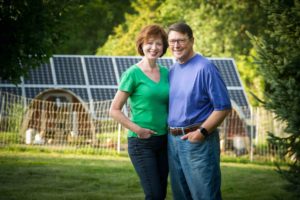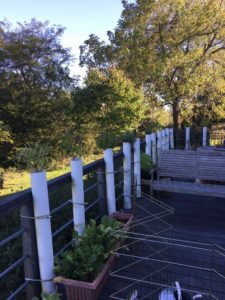136: Tim Diebel, from Pastor to Farmer
A conversion to organic farming and growing food simply.
.
 Tim grew up in West Texas, the younger son of a local church pastor and his Christian educator wife. After graduating from Texas Christian University in Fort Worth, TX with a BFA in speech communications, he went on to seminary, graduating with a Master of Divinity degree. After graduating, he served churches in Texas communities in Houston, Athens and Lufkin; and then he moved to a historic urban congregation adjacent to Drake University in Iowa.
Tim grew up in West Texas, the younger son of a local church pastor and his Christian educator wife. After graduating from Texas Christian University in Fort Worth, TX with a BFA in speech communications, he went on to seminary, graduating with a Master of Divinity degree. After graduating, he served churches in Texas communities in Houston, Athens and Lufkin; and then he moved to a historic urban congregation adjacent to Drake University in Iowa.
During the course of that 19-year ministry, Tim became captivated by questions about food, our global food system, and the need for a strengthened circle of memory around how to grow food on simpler terms. So, at 55 years of age, he quit his job and with his wife moved to a 10-acre farmstead they’ve named “Taproot Garden” located south of Des Moines where they cultivate a large garden and raise laying hens – an enterprise he refers to as a writing project with an outdoor classroom.
In This Podcast: Greg interviews Tim and finds out what motivated Tim and his wife to move to the country and start focusing on growing food through simple techniques some of which are those which were used a couple generations back. Through experimentation, they have increased their harvests dramatically, and even Greg is blown away by how many tomatoes they got this year. And there is a great story about a kindergartner’s comment after visiting his farm which is awesomely rewarding to any farmer.
Listen in to Learn About:
- How reading a book during a staycation changed their focus on food
- Then cooking became a date night activity and led to wanting to know more about where it came from
- How a realization of how our food production is so dependent on cheap energy made them consider how important self-reliance is for food
- Why he felt the need to change to farmer after years of ministry work
- What the name of their farmstead is and how it came about
- Why he thinks the change was more of an incremental change than a radical shift

- Working with his wife on the farm and the benefits they are seeing
- How they have been successful growing in the greenhouse
- More about soil blocking and how that changed their harvest results
- This year they brought in about 50lbs of tomatoes a day for weeks
- What they did to survive the massive harvest
- What they are sharing the most – it’s not tomatoes
- How they are connecting agriculture, nature, and those who are in missionary work
- Connecting with kids on trying to solve a chicken escape
- The layout of their 10-acre farmstead with the labyrinth, ¼ acre gardens, chicken yard, ground mounted solar panel system, portion of native grassland in process of being restored, and a largely unexplored wild land
- The trails and walking areas around the property
- Expanding to add fruit trees
- Experimenting with wheat using “ancient” processes like a hand scythe, home milling, and other fundamentals
- The transition from a deck in a townhouse to the land they have now
- A simple pipe planting system that made gardening in small spaces more efficient
- Making the shift to this new lifestyle as a married couple
- How his ministry is still interplaying in his life and gives him a reverence for gardening
- Taste of Place and how he sees churches having similar connections to this farming concept
 As well as:
As well as:
- How he learned that agriculture does not necessarily follow the same pattern as the year before and that gardening is less like a circle and more like an elongated slinky
- That his biggest success is the comment from a kindergartner after she visited the farmstead
- How the bible verses from Isaiah chapter 11 are the most moving and anticipatory verses that offer a global permaculture perspective
- His advice to listeners is to try to grow in a pvc pipe, or just by sticking a seed in the ground and just don’t be afraid to experiment
.
Book Recommendations and mentions by Tim:
The Third Plate by Dan Barber
Agricultural Testament by Sir Albert Howard
In Defense of Food by Michael Pollens
Scripture, Culture, and Agriculture: An Agrarian Reading of the Bible by Ellen F. Davis
How to reach Tim:
*Disclosure:
Some of the links in our podcast show notes and blog posts are affiliate links and if you go through them to make a purchase, we will earn a nominal commission at no cost to you. We offer links to items recommended by our podcast guests and guest writers as a service to our audience and these items are not selected because of the commission we receive from your purchases. We know the decision is yours, and whether you decide to buy something is completely up to you.



